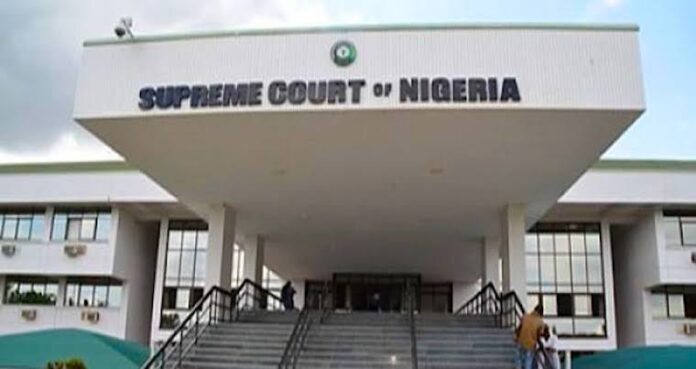By Anthony Ochela, Abuja
The Supreme Court has nullified the decision of the Kebbi State High Court that reinstated Al-Mustapha Haruna Jokolo as the 19th Emir of Gwandu, declaring that the case was filed without first exhausting the mandatory domestic resolution mechanisms prescribed by law.
In a lead judgment delivered on Wednesday by Justice Emmanuel Agim, the apex court held that while aggrieved persons are not barred from approaching the court, they must first comply with provisions of Section 5(4) of the Kebbi State Chiefs (Appointment and Deposition) Law, which requires formal complaint to the governor before litigation.
“This suit was filed prematurely without first presenting a complaint to the governor as stipulated by law. The trial court lacked the jurisdiction to entertain the matter and its decision is, therefore, a nullity,” Justice Agim ruled.
Jokolo, who was deposed in 2005 under controversial circumstances, secured a favourable ruling from the Kebbi State High Court in 2014, which was subsequently upheld by the Court of Appeal, Sokoto Division, in 2016.
Both courts ordered his reinstatement as Emir.
However, the Kebbi State Government and the current Emir, Alhaji Muhammadu Ilyasu-Bashar, challenged the rulings at the Supreme Court.
The apex court agreed with the appellants, holding that the failure to first seek resolution through administrative channels rendered the suit incompetent.
“Section 4(3) of the law applies both to appointment and deposition matters. The governor must first be notified,” Agim stated, adding that the High Court judge “robbed the court of jurisdiction” by proceeding without adherence to this requirement.
The judgment means the 2016 decision of the Court of Appeal, which upheld the lower court’s ruling, is also void.
The Supreme Court set aside the rulings of both courts and entered no order as to costs.
In a split decision, Justice Ibrahim Mohammed Salami delivered a dissenting minority judgment, dismissing the cross-appeals and affirming the decision of the lower courts, arguing that the executive governor must act in accordance with law and due process.
The Supreme Court consolidated all four appeals and two cross-appeals into a single judgment, with all parties consenting that the outcome of the principal appeal would bind the others.
Legal counsels in the matter included Barrister Sylvester Imhanobe for the deposed Emir, Yakubu Maikyau (SAN) for the Kebbi State Government, and Hussaini Zakariya (SAN) for the current Emir.
The judgment, originally slated for June 6, was brought forward to June 4 due to the Eid-el-Kabir holidays.
The ruling marks the final legal chapter in a two-decade-long tussle over the Gwandu Emirate throne and reaffirms the necessity of exhausting traditional and administrative procedures before seeking judicial remedy in chieftaincy disputes.





